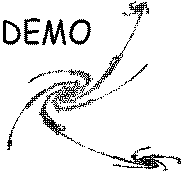

Themes
DEMO focuses on origins and principles of organization for complex
systems. If we can create chain reactions in complexity with a universal
computational substrate, then certain hard problems should become easier
to solve.
Exploiting the Complexity of Dynamical Systems
We have shown that recurrent neural networks can have extensive
fractal state-spaces. This is exploitable in several ways for any
general system where sensitivity to small changes requires amplified differences.
We use such dynamical systems in our work on cognition,
including as a model for highly generative reconstructive
memory or mental imagery, increasing the capacity of our
Recursive Auto-Associative Memory (RAAM) model
for representing recursive structures in neural networks.
Co-Evolutionary Learning
Most learning takes place as optimization of a fixed environment or
fitness function. This requires that the learner be "pre-adapted" to
that environment in order to learn anything, or that the environment
be "gradient engineered" for the particular learning mechanism. This
inductive bias usually makes the researcher the primary cause
of learning. We focus on dynamically-changing learning
environments, often composed of competing learners, where the
complexity of the task gradually and automatically increases
without human intervention. We work in games, language
learning, and computational optimization tasks.
Structure in Neural Networks
The fixed kinds of structures upon which neural network learning
technology operates is a case where the network and the learning
environment have been pre-adapted. Successful uses of neural networks
have required humans to do the hard learning, and then use weight
adjustment for fitting parameters. We look at problems
where task-specific structure is necessary and can
arise through modulated mutation of network structures themselves.
Evolutionary Machines
The long term goal is the co-evolution of machines and their brains,
first in simulation, then, through advanced
computer-aided manufacturing, into actual hardware. Our initial
experiments simulate LEGO structures, evolve machine
codes and interpreters, and groups of simulated robot agents.


 demoweb@cs.brandeis.edu
demoweb@cs.brandeis.edu



 demoweb@cs.brandeis.edu
demoweb@cs.brandeis.edu